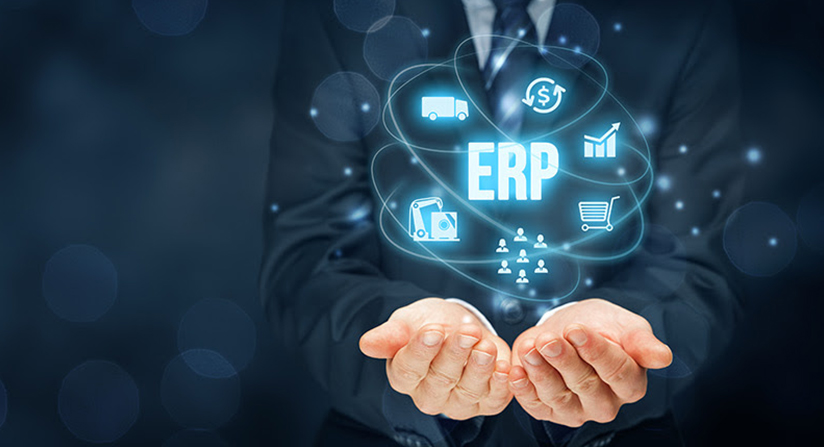1. What is ERP?
ERP stands for Enterprise Resource Planning – enterprise resource planning software. This system allows all parts of the enterprise to access internal data to use and from there the management will easily manage the entire operation of the company.
Specifically, ERP can be understood as follows:
- E-Enterprise (enterprise): The main purpose of this system is to connect and synchronize work between departments, mainly serving businesses, helping to update all necessary and automatic information, reducing errors error in the processing of the business.
- R-Resource: This system will help make full use of the company's resources, especially human resources.
- P-Planning (planning): The ERP system supports the company in planning and operations in production and business. The planning part will outline the direction for the business, calculate and forecast the possibilities that may arise in the future.
2. What are the functions of ERP software?
A basic ERP system will include the following components:
- Purchasing management: ERP system will help businesses make and manage purchase plans, purchase requisitions; Manage and track the status of orders and purchase contracts; Follow up supplier debt, make purchase report.
- Sales management: ERP will support your business to set up and manage quotes, orders, and contracts on the software; Manage orders and track the progress of orders and sales contracts; Follow up customer debt, make sales report.
- Inventory management: Jobs such as import, export or inventory management, warehouse management and inventory reporting can all be done on the ERP system.
- Accounting - Finance Management: ERP will also support businesses to perform accounting-finance related tasks such as: Cash accounting (managing cash flows, bank money, loans, etc.) ...); Purchasing accounting; Sales Accounting; Tax and salary accounting; General Accounting;…
- Production planning: With the ERP system, supporting production planning, material planning will become more convenient and simple.
- Management reports: All kinds of data in periodical profit analysis reports or business plan implementation reports are fully aggregated on ERP.
3. What are the benefits of an ERP system?
After learning what ERP is and its functions, you can also see the essential role ERP plays in your business. It is thanks to ERP that connects and merges software in the same system that helps businesses achieve a number of benefits such as:
Human Resource Management
It was extremely difficult to keep track of each person's work completion, workload, working hours, and departure time in the past. But now with ERP software, it will be easier for the company to know all the workloads, working hours of each employee and make reasonable adjustments.
Convenient communication
ERP makes communication between departments, divisions, branches easier. All information is homogenized, thereby helping to minimize conflicts of interest between departments in the company.
Accounting and finance management
True to the function of ERP, accounting and financial data are stored in the same place and synchronized, used throughout for all departments, departments or branches. When any change occurs, all information is automatically displayed and recalculated to match and help avoid errors.
Inventory management
The ERP system will control the amount of goods left in the warehouse. From there, the business owner based on that basis to understand the situation and adjust the quantity of imported and exported goods accordingly to avoid losses and waste.
Customer Information Management
The ERP system will help businesses store full customer information from names, addresses, problems they are facing, etc., so that they can best serve and take care of customers.

4. Types of popular ERP solutions today
What is an ERP solution? It is the application of an ERP system to the enterprise to improve and enhance the management process as well as to plan resources reasonably. There are three main types of enterprise ERP implementations today:
Local ERP: deployed locally on hardware and servers, and managed by enterprise IT staff. Since your data is stored on your own servers and devices, you can have 100% control over your data.
Cloud ERP: instead of local server hosting, with this type, your ERP provider will host it for you. You can access this system anytime, anywhere. The only thing you need is a good Internet connection. Cloud ERP provides enterprise-grade security to protect as well as reduced cost of ownership, ease of use, and flexible configuration.
5. How to choose the right type of ERP solution for your business
To choose the right type of ERP solution, businesses need to consider the size of the company, the needs and scope of ERP implementation as a basis for choosing the right implementation solution:
- Company size
- Number of employees who will use the ERP system
- Group of products, products of business and production
- Scale to expand and develop in the future
- What are the issues the company needs most attention today? What are the current difficulties in each department, which needs to be solved?
- What is the budget for ERP investment?
6. Notes when implementing ERP business management software
Because ERP is a large system, it is necessary to cover and manage the entire resources of the enterprise, so before implementing ERP solutions, business owners should note and consider the following issues:
Plan carefully
According to ERP Report 2022 from Panorama, the total cost of ERP implementation in a mid-sized business ranges from $150,000 to $750,000. Also in this report, the implementation time of the ERP system will range from 2 to 5 years.
At that cost, you will own an integrated system package with all the functions of ERP. However, most businesses do not need to use all the functions, nor does ERP allow businesses to separate each application to serve different work stages.
In addition, such a long time to implement ERP can make the system after completion become obsolete, no longer suitable for the operating characteristics of the current business. In addition, the deployment time also leads to an increase in costs and resource consumption of enterprises.
Beware of risks
In an ERP system, all modules use the same data source. This also means that a small change will entail a change of the whole system, when brought to ERP can turn into a large-scale error, causing great loss for businesses.
Contingency for change options
Enterprises need to reserve for future changes before starting to build the system. ERP is a very difficult system to change, any upgrade action after it has been put into use should be limited.
However, for force majeure reasons, businesses still have to upgrade the system to match the job requirements. In addition, businesses can use the old ERP and supporting software in parallel to be safe and save more time and costs for businesses.












Replies to This Discussion